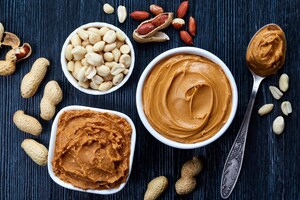
The Peanut Institute Provides Recommendations and Recipes
ALBANY, Ga., Oct. 5, 2022 /PRNewswire/ -- Fall is a great time for children and adults to get back into a regular schedule, including a healthy eating routine. One easy, inexpensive and tasty ingredient for overall health and wellness is peanuts.
Peanuts are a versatile, plant-based protein that can be incorporated into any daypart – breakfast, lunch, mid-day snack or evening meal – and deliver a host of benefits related to energy, focus, mood and satiety.
"Depending on the situation, adding peanuts and peanut butter can address a variety of issues throughout the day," said Dr. Samara Sterling, research director for The Peanut Institute. "Recent research conducted in the United States, Spain and Australia has documented the positive effects of daily peanut consumption since these mighty legumes are packed with protein, fiber, vitamins and minerals."
For example, for those who'd like more morning energy, a breakfast of peanut butter on multigrain toast is a smart choice. Peanuts are considered an energy-dense food thanks to the plant-based protein and healthy fats they contain, which means the body taps into them for long-lasting fuel [1].
For a mind and mood boost, a mid-morning peanut snack is just the ticket. A recent study of college students (ages 18-33) conducted by the University of Barcelona found that daily peanut or peanut butter consumption was associated with improved memory, a reduction in stress and decreased anxiety and depression [2]. One healthy snack that's quick and easy to assemble is apples slices double dipped in peanut butter and crushed peanuts.
The afternoon slump can be a real downer for some. Peanuts come to the rescue since they have a low glycemic index. That means they won't spike blood sugar the way carb-heavy snacks or sugary sodas might, which is what leads to the feeling of "crashing" later.
Finally, for those who consume extra calories at night, a handful of peanuts as an evening snack can calm any cravings and help avoid the urge to load up on unhealthy processed or fatty foods.
"Another benefit of peanuts is the satiety they deliver. Peanuts are high in three macronutrients – protein, fiber and healthy monounsaturated and polyunsaturated fats – so they help you feel full longer," said Dr. Sterling.
In addition to the day-to-day benefits, eating peanuts is associated with:
- 21% lower risk of premature death [3]
- 24% reduced risk of death from heart disease [4]
- Reduced risk for colorectal, gastric, pancreatic and lung cancers [5]
To incorporate peanuts and peanut butter into a healthy eating routine, The Peanut Institute has assembled a collection of simple yet tasty recipes. For more information, visit peanutinstitute.com or follow The Peanut Institute on Instagram, Facebook or Twitter.
Based in Albany, Ga., The Peanut Institute is a non-profit organization supporting nutrition research and developing educational programs to encourage healthful lifestyles that include peanuts and peanut products. The Peanut Institute pursues its mission through research programs, educational initiatives and the promotion of healthful lifestyles to consumers of all ages. As an independent forum, The Peanut Institute is uniquely positioned to work with all segments of the food industry, the research community, academia, consumer organizations and governmental institutions.
Sources:
- Arya SS, Salve AR, Chauhan S. Peanuts as functional food: a review. J Food Sci Technol. 2016 Jan;53(1):31-41. doi: 10.1007/s13197-015-2007-9. Epub 2015 Sep 19. Review. PubMed PMID: 26787930; PubMed Central PMCID: PMC4711439.
- Parilli-Moser, I., et al., Consumption of peanut products improves memory and stress response in healthy adults from the ARISTOTLE study: A 6-month randomized controlled trial. Clinical Nutrition, 2021.https://doi.org/10.1016/j.clnu.2021.09.020
- Luu HN, Blot WJ, Xiang YB, et al. Prospective evaluation of the association of nut/peanut consumption with total and cause-specific mortality [published correction appears in JAMA Intern Med. 2016 Aug 1;176(8):1236]. JAMA Intern Med. 2015;175(5):755-766. doi:10.1001/jamainternmed.2014.8347.
- Alper CM, Mattes RD. Effects of chronic peanut consumption on energy balance and hedonics. Int J Obes Relet Metab Disord. 2002 Aug;26(8):1129-37. doi: 10.1038/sj.ijo.0802050. PMID: 12119580.
- Zhang D, Dai C, Zhou L, et al. Meta-analysis of the association between nut consumption and the risks of cancer incidence and cancer-specific mortality. Aging (Albany NY).
SOURCE The Peanut Institute








Share this article